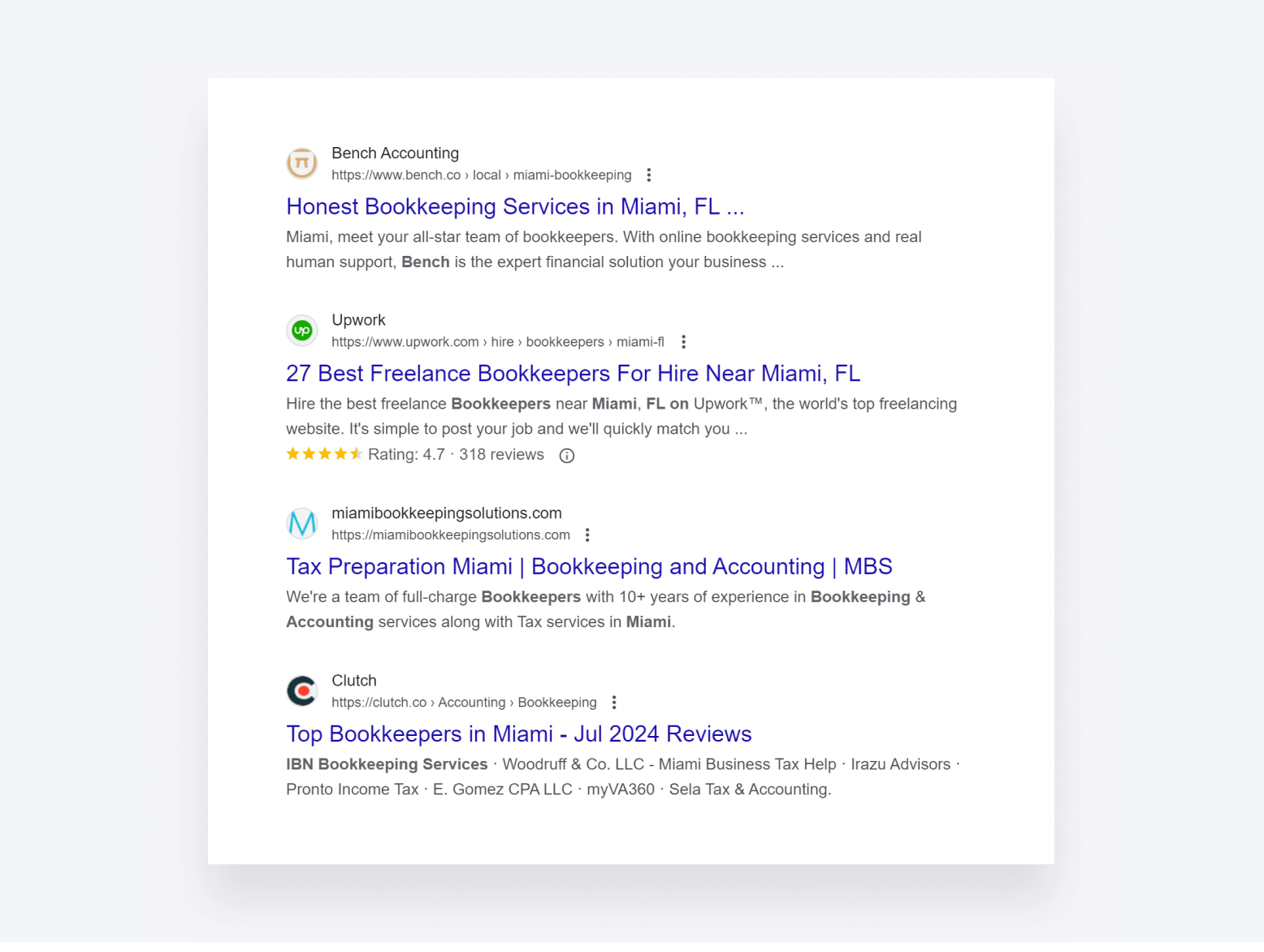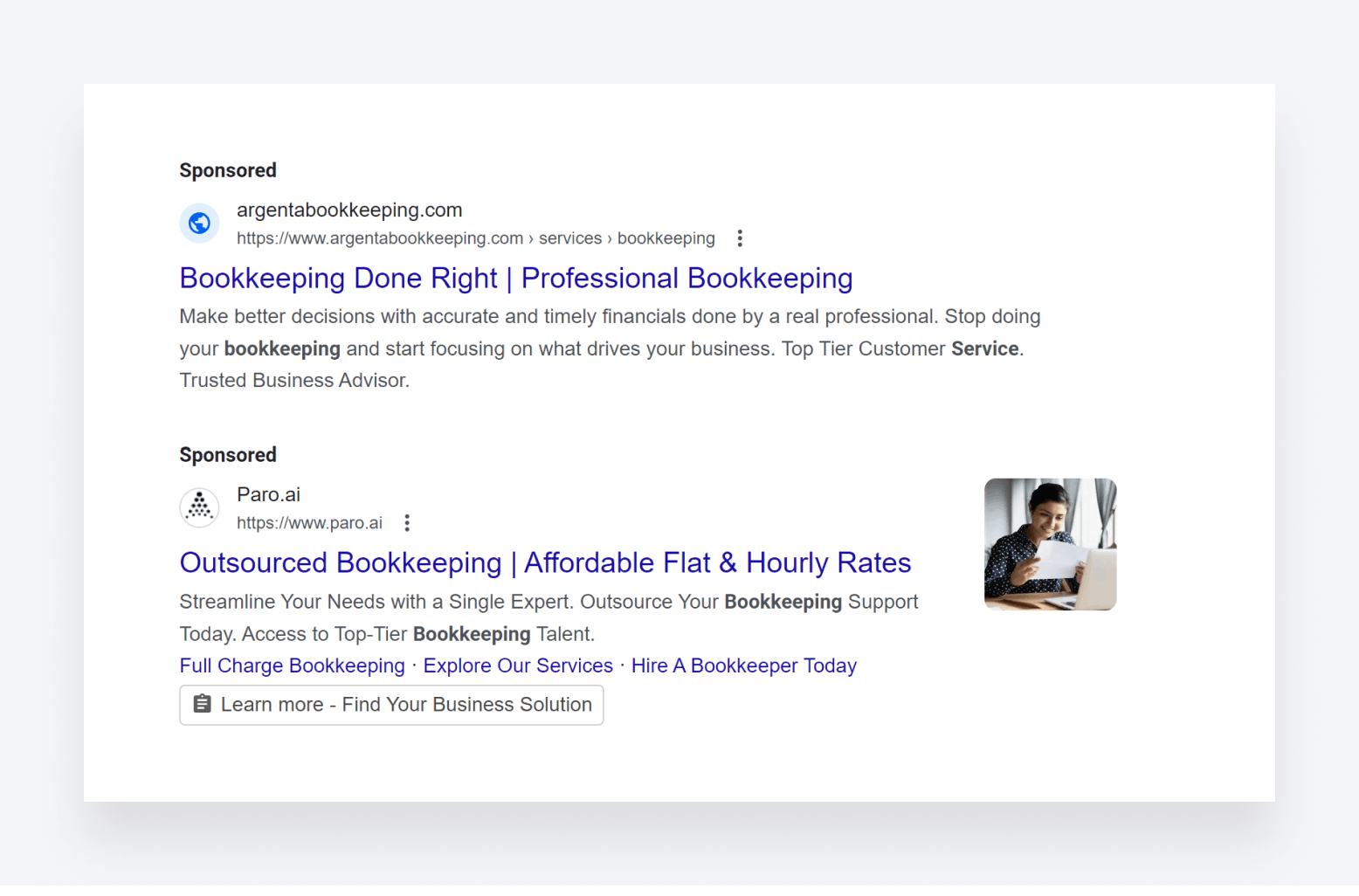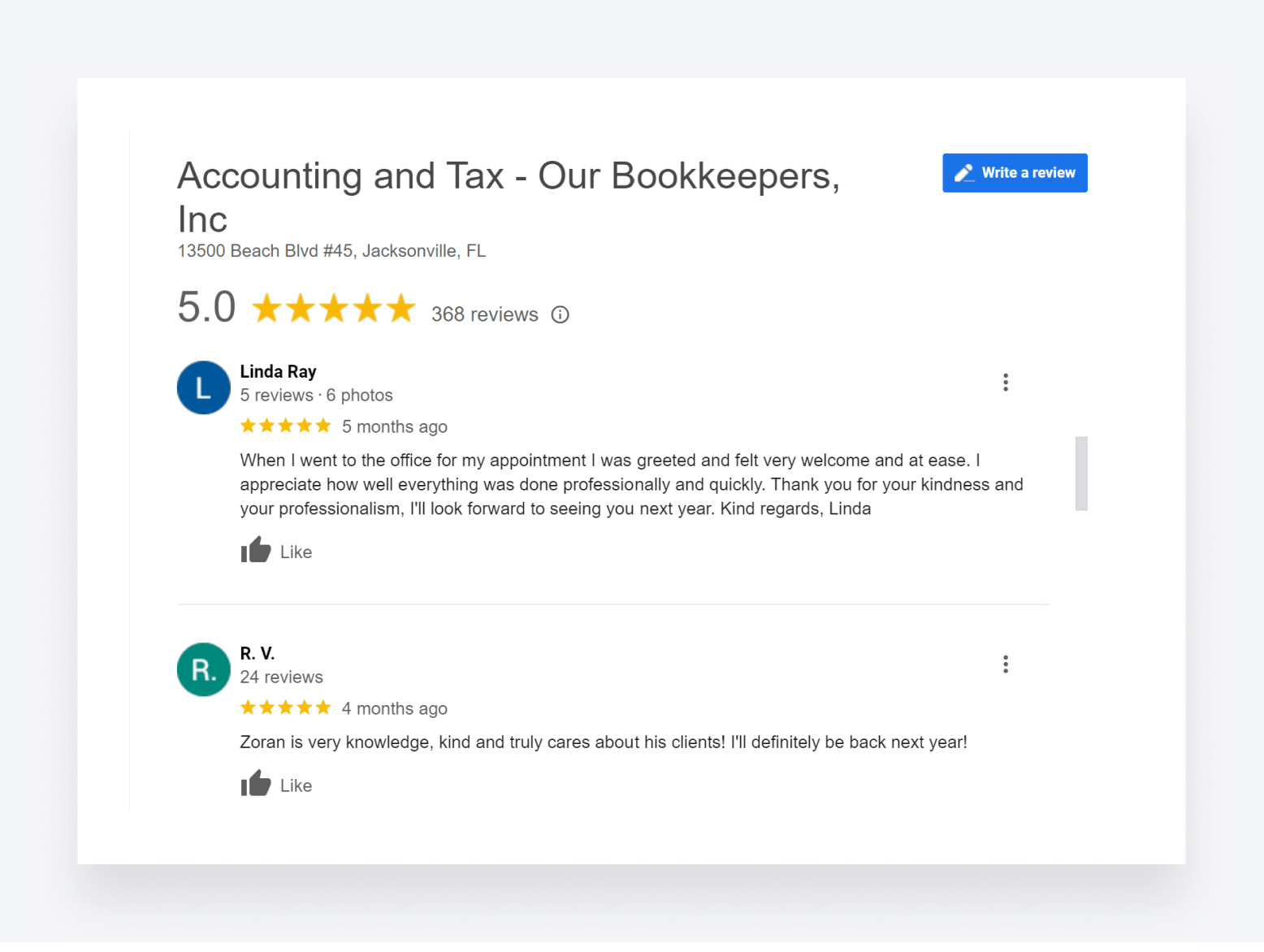
Client acquisition is one of the biggest challenges for bookkeeping businesses. It doesn’t matter how amazing your skills and experience are, if you can’t attract new clients, your business won’t thrive.
So once you’ve decided to start a bookkeeping business, how do you tell the world about the amazing services it offers? How do you stand out from the bookkeeping crowd? The answer is with effective marketing.
In this article, we’ll highlight 12 powerful marketing strategies that will help you spread the word and attract more clients.
- Create a professional website
- Drive organic traffic with SEO
- Engage potential clients with content marketing
- Get your bookkeeping business seen with Google Ads
- Drive local interest with a Google Business Profile
- Encourage clients to leave online reviews
- Target niche audiences on industry-specific websites and groups
- Network like there’s no tomorrow
- Showcase your expertise on Quora
- Use LinkedIn — the social media dinosaur with a powerful bite
- Get listed on industry directories
- Leverage the power of social media
1. Create a professional website
Every bookkeeping practice needs an online presence. A website serves as your digital storefront, presenting your services and prices to potential new clients.
With 93% of people using the Internet to find new businesses and services, if you don’t have a website, you’re missing out on a whole world of potential clients. At the same time, if your website is old-fashioned looking or difficult to navigate, visitors may be put off from the start. First impressions matter, after all.
Creating an attractive website needn’t be an overly complicated and technical process. With modern web-builder services, you can create a website using drag-and-drop elements in a matter of hours. Most web-builders also cover domain names and web hosting as well.
As a rule of thumb, the best websites have the following characteristics:
- Attractive to look at
- Easy to navigate on any device
- Include key information about your business, services, and prices
- Offer valuable content, such as blog posts, guides, or templates
- SEO optimized (more on that below!)
2. Drive organic traffic with SEO
Creating a website is one thing. Getting it seen is another altogether. That’s where SEO (search engine optimization) comes in. SEO is the blanket term for a range of different strategies used to get your website ranking highly on search engines such as Google.
By optimizing your website for certain keywords — i.e. words that potential clients might type into Google when searching for a bookkeeper — you can ensure that your website appears near the top of the list. Between 70 and 90% of all search traffic clicks are captured by businesses on the first page of search results, so it’s important that you rank as highly as possible.
Here are some results on Google’s first page for the keyword “bookkeeping business in Miami, Florida”.

To ensure that your website ranks highly, you’ll need to focus your efforts on the following key areas:
On-page optimization
The content of your web pages — including texts, headlines, titles, meta descriptions, etc. — should be optimized for specific keywords that potential clients are likely to use. You can choose different keywords for different pages, ensuring that each page has a specific focus and topic.
You should also ensure that your pages link to one another using relevant anchor text — i.e. the clickable text of a link. So if you’re writing a blog post about your services, for example, you can link to your services page using the anchor text “bookkeeping services”. Internal linking not only improves SEO but also makes it easier for visitors to navigate your website.
External (off-page) optimization
You can also improve your chances of ranking highly with backlinks, which are links to your website from other websites. The more authoritative those websites, the better. There are plenty of ways you can build a strong backlink profile, including:
- Participating in a link exchange with another business
- Writing guest articles on industry-relevant blogs
- List your business on online directories such as Google My Business, Yelp, and Clutch
Besides backlinks, you can also boost your SEO by collaborating with industry experts and influencers, tapping into social media, and earning positive online reviews and ratings.
Technical optimization
Make sure that the site is free of technical errors that affect search engine rankings. Most SEO software offers audit tools that check for technical issues such as:
- Broken links
- Duplicate content
- Slow loading speeds
- Security issues
For a deeper dive into SEO best practices, check out our article: SEO for accountants.
3. Engage potential clients with content marketing
Content marketing is a tried-and-tested way to reach your target audience. With a steady stream of carefully crafted content, you can provide real value to potential customers by answering their questions, offering useful insights, or giving them access to practical materials and resources. At the same time, you can alert them to your services and put your practice on their radar.
There are various ways you can use content marketing to promote your bookkeeping business, including:
- Regular blog posts covering news, best practices, and company updates
- Ebooks, guides, and white papers covering bookkeeping trends and challenges
- Video content, webinars, or podcasts
- Weekly or monthly newsletters

An example of a blog from Bookeeps, a bookkeeping business in New York.
To deliver consistently high-quality content, you’ll need to focus on what matters most to your target audience. What are their pain points and challenges? What questions do they have that need answering? What important information might they be missing?
By understanding people’s bookkeeping needs, answering their questions, and providing useful tips, you’ll position yourself as a conscientious and professional bookkeeper. You can then subtly promote your business and services as a solution to people’s challenges.
To work effectively, content marketing needs a certain amount of momentum. Posting one blog post won’t do much, but publishing regular content each week will. You can also use social media to share your blog posts and other content and increase engagement.
Pro tip: a great lead-generation strategy is to create high-value “gated” content that potential new clients can access by completing a simple submission form, including their name and email address. You can then engage those leads with targeted email marketing.
4. Get your bookkeeping business seen with Google Ads
While SEO involves a lot of effort to get results, you can guarantee that your website gets seen with Google Ads. Unlike SEO, which focuses on driving organic traffic to your website, Google Ads puts your website at the top of search results for certain keywords.
You can see businesses that have paid for Google Ads when your search returns “sponsored” options. See the examples below for the keyword “bookkeeping services California.”

Google Ads has the obvious benefit of guaranteeing that your firm sits top of the pile for specific keywords. For this reason, it may seem like a better alternative to SEO. But Google Ads also has several drawbacks to consider. Let’s explore the differences between Google Ads and SEO in the table below:
| Google Ads | SEO |
| Generates immediate visibility and traffic | Takes time to rank highly |
| Results are short term | Drives results over the long term |
| Requires relatively little effort | Requires sustained effort over time |
| Campaigns cost money and can get expensive | No direct costs but involves a time investment |
Ideally, Google Ads should be used to supplement your SEO strategy, providing a short-term boost in results, rather than replacing it altogether. Generally speaking, SEO is an essential strategy for any online business, while Google Ads is more of an optional extra for those that can afford it.
5. Drive local interest with a Google Business Profile
Formerly known as Google My Business, Google Business Profile is a free service that enables businesses to increase their visibility in local search results. With a Google Business Profile, your firm can be listed on the Google Maps element of search results. Here are the Google Business Profile results for “bookkeeping businesses in Detroit”:

As you can see, in addition to your business appearing on the local map, it also shows additional information about your business, including its address, opening hours, ratings from Google reviews, and more. This adds credibility to your business, helping you to establish yourself in the local community.
To create a Business Profile, you’ll need an active Google account. Simply go to google.com/business, click “Manage Now”, and follow the set-up steps. This process includes:
- Claiming or creating your Business Profile
- Adding key information about your business and the services it provides
- Verifying that you are the business owner
Pro tip: when you compose the headline for your business profile, it’s a great idea to add some descriptive keywords. Not only will this help communicate what your business offers, but it will also help you show up higher on the list when people use those keywords. Check out the example below:

6. Encourage clients to leave online reviews
With 98% of consumers claiming that online reviews are an essential resource when making purchase decisions, bookkeeping firms that have a large number of positive reviews will outperform those that don’t.
Social proof is a powerful tool in marketing. People naturally trust what existing clients have to say about a service more than what a business says about itself. To tap into this power, you should encourage your clients to leave an online review once the service is completed. The more reviews you get, the better.

Besides bringing genuine credibility to your bookkeeping business and being the deciding factor in new clients working with you, reviews also provide you with valuable feedback. Bad reviews, while uncomfortable, can help you improve your services for future clients.
And remember: excellent reviews are a valuable marketing resource. Once you have them, you can use them across your website, blog posts, and other content marketing efforts to show the value your business brings to clients.
Pro tip: respond to as many reviews as you can — especially the bad ones! This shows that you are keen to engage with clients, value their opinions, and are committed to improving your services.
7. Target niche audiences on industry-specific websites and groups
Industry-specific websites can help you advertise directly to a niche target audience. If a lot of your bookkeeping clients are in the hospitality industry, for example, you may want to advertise on a website for restaurant or hotel owners.
You can extend this idea to cover groups, message boards, and anywhere else that professionals from a certain industry gather online. LinkedIn, for example, is a great place to connect with potential new clients.
Here are just some examples of groups for small business and startup owners:

8. Network like there’s no tomorrow
Amid more complex, technical marketing strategies, it’s easy to overlook one of the most powerful ways to promote yourself and your business: networking. Today, the majority of networking takes place online. Social media sites such as LinkedIn or Facebook are a great place to meet other professionals, join groups, and connect with potential clients.
When it comes to high-quality interactions, nothing beats meeting people face-to-face, however. Make sure you attend industry meet-ups, accounting conferences, and other live events. The more connections you make, and the more lasting impressions you create, the more well-known you and your business will be. Just remember to take some business cards or flyers to hand out!
Pro tip: you can take your networking up a notch by offering to speak at events. This will take your credibility through the roof, showing you and your business as industry leaders.
9. Showcase your expertise on Quora
You’ll probably know Quora as an online community where people ask and answer questions, but did you know it’s also a powerful platform for marketing your business?
Quora takes a very democratic approach to discussions, enabling users to upvote and dispute responses. As a result, the best answers to questions rise to the top and get the most engagement.

By creating a Quora account for you or your business, you can answer questions asked about bookkeeping and accounting. If readers find your answers useful, they’ll be upvoted to the top of the pile, providing you with a platform to demonstrate your expertise, experience, and thought leadership. You could even become a Quora influencer!
With over 300 million monthly visitors, Quora offers a huge reach, which helps to boost brand awareness. What’s more, Quora content is searchable on Google, often ranking highly in search results.
Started way back in 2003, before “social media” was even a term the average person knew, LinkedIn is older than YouTube, Twitter, and even Facebook. While platforms from a similar era such as MySpace and Friendster have long since disappeared, LinkedIn has stood the test of time and now has over one billion users worldwide.
When it comes to marketing a bookkeeping business, LinkedIn deserves its own section. As the foremost social media site for professionals, LinkedIn is the perfect place to grow your network, promote your business, and demonstrate your expertise. Here’s an example of a bookkeeping business profile on LinkedIn:

Here are some ways you can use LinkedIn to market your business:
- Set up a business profile, complete with key information about what your business offers
- Position yourself as a bookkeeping thought leader by posting valuable content
- Connect with potential clients, partners, and industry leaders
- Use LinkedIn Sales Navigator to identify and reach out to leads
- Leverage LinkedIn Ads to run targeted ad campaigns and promote content
11. Get listed on industry directories
Industry directories are a simple yet effective way to connect potential clients with service providers. Like the Yellow Pages of old, online directories provide a list of industry-specific businesses, searchable by service type and location. These businesses are often vetted to meet certain standards, providing an extra layer of credibility and trust.
There are plenty of general business directories, such as Yelp, Clutch, and Trustpilot. Besides listings, these sites offer client reviews and ratings, which can help promote your business. Then there are industry-specific directories — the Digital Bookkeeper Association offers a “Find a Bookkeeper” service, for example.
Some software providers also offer business directories for their users. TaxDome, for example, offers the TaxDome Advisors directory, where potential clients can connect with accounting, tax, and bookkeeping businesses that have achieved TaxDome Advisor status. This means they’ve passed an examination designed to show proficiency in TaxDome’s award-winning practice management software.

Almost five billion people use social media worldwide. That’s well over half the world’s population and the vast majority of adults. In short: if you aren’t active on social media, you’re missing one of the biggest, most lucrative marketing opportunities of all time.
Social media is a broad term encompassing a range of different platforms, each with its own unique qualities. The first step is to understand where your target audience spends its time and focus your efforts there. LinkedIn, Facebook, and Instagram are great places to start. Once you’re set up, here are some best practices to help you promote your business, connect with your audience, and increase brand visibility:
- Post regular content and updates, including tips, industry news, and client testimonials
- Tailor content to different platforms — LinkedIn is great for posting blog posts, Instagram is great for short, image-based posts
- Engage with followers by asking questions, responding to comments, and joining groups
To sum up
Effective marketing can be the difference between a successful bookkeeping practice and a failed one. After all, clients are the lifeblood of any business, and marketing is how you find them.
There are all sorts of ways to promote your business and connect with potential clients, and the best approach will depend on your time, resources, and skills. The strategies we’ve outlined today are a great place to start.
If getting new bookkeeping clients is one challenge, retaining them is another altogether. To ensure your clients stick around, you’ll need to offer outstanding client service — and that means choosing the right technology.
With TaxDome, you get all the tools you need to run a high-performing bookkeeping business — from workflow automation and team collaboration to document management, analytics, and much more. At the same time, your clients can manage all interaction with your business via a secure client portal, or using our top-rated client mobile app. The result is happier, more loyal clients — and a more profitable business.

Thank you! The eBook has been sent to your email. Enjoy your copy.
There was an error processing your request. Please try again later.
What makes the best accounting firms thrive while others struggle to keep up? We analyzed our top 20 TaxDome firms, representing over $100M in combined revenue, to uncover the strategies driving their success.



